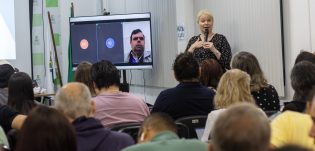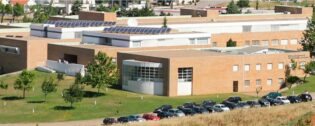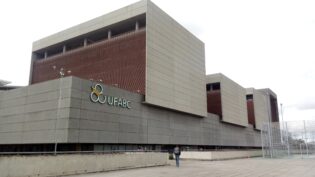Per(courses) of researchers in teacher training: possibilities and challenges for institutional transformation in education and technologies
Published 14 August 2024
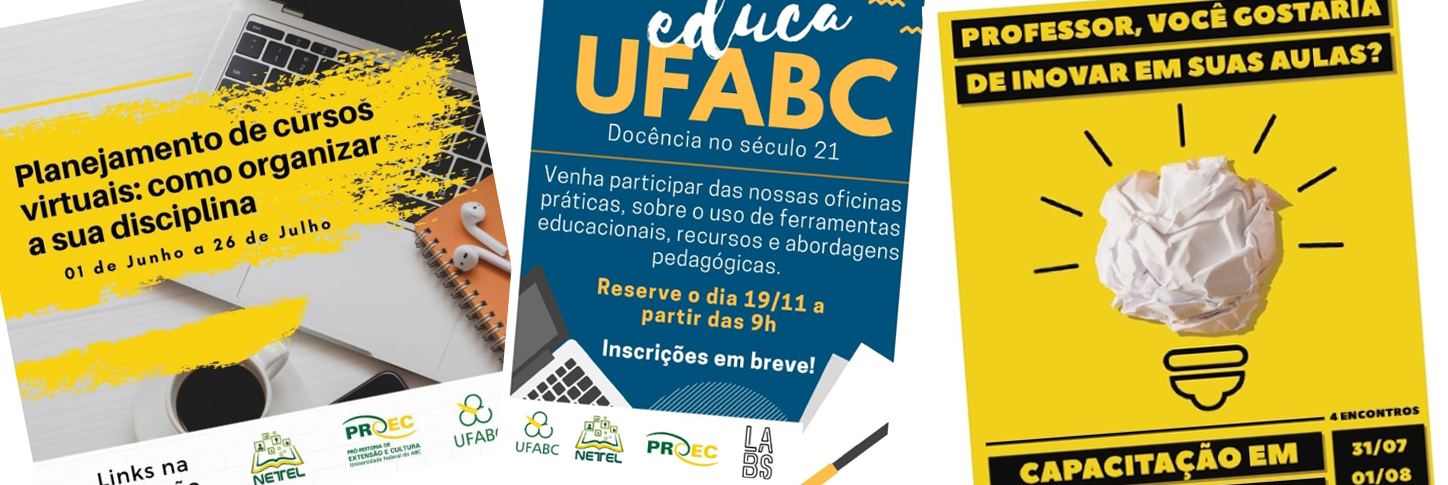
Photo by: Embrace Team
Thus, the following sections present actions coordinated by the researchers, such as training courses, workshops and events, which culminated in the approval of the international research project Erasmus Capacity Building Higher Education “EMBRACE – Education Modernization Brazil, Colombia, Europe – the new era of digital higher education cooperation, valid from 2023 to 2026, in which, in addition to UFABC, other Higher Education Institutions (HEIs) from Brazil, Finland, Portugal and Colombia participate.
Researchers’ per(courses) in teacher training with technologies
The background to this article is the collaborative experience of the researchers in the field of technology-mediated education. Their common interests crossed paths when they organized the Virtual Course Planning (PCV) training course, offered in 2020, in the context of preparing teachers for Emergency Continuing Education (ECE), held at the Federal University of ABC (UFABC). This first collaboration resulted in partnerships in extension and research activities that continue despite the institutional dislocation between them and their national and international network of collaborators.
Thus, the following sections present actions coordinated by the researchers, such as training courses, workshops and events, which culminated in the approval of the international research project Erasmus Capacity Building Higher Education “EMBRACE – Education Modernization Brazil, Colombia, Europe – the new era of digital higher education cooperation, valid from 2023 to 2026, in which, in addition to UFABC, other Higher Education Institutions (HEIs) from Brazil, Finland, Portugal and Colombia participate.
The aim is to describe, in this special edition dedicated to research conducted by women, the background and developments of network interactions that have enabled different Higher Education Institutions (HEIs) interested in fostering transformations in academia and the world of work in the 21st century, through research based on education with new technologies.
Courses
New Technologies and Methodologies for Education (NTME) was a teacher training initiative by the Educational Technologies Center (NTE), now the Educational Technologies and Languages Center (NETEL), of the Federal University of ABC (UFABC), which aimed to promote the use of innovative technologies and methodologies in teaching, mainly for UFABC teachers interested in offering distance learning courses. The course was offered in semi-presential mode and, at every opportunity, the content, activities and teaching strategies were reformulated based on the participants’ evaluations and the team’s own experiences. Gradually, the NTME became an extension course, involving other interested people and participants from all levels of education, including early childhood education. The researchers’ involvement in this action ranged from their own training to coordinating various editions of the course, resulting in important input for further study, planning and development of future actions.
As a result of the many changes made to the NTME and the need to incorporate other perspectives on the integration of technologies into the teaching-learning process, a new course format was developed. Called Virtual Course Planning, PCV was a teacher training course planned, designed and conducted in 2019 by Carla Rodriguez and Carolina Carvalho, who were joined by Marcella Abreu for the 2020 and 2021 editions.
The first offering took place at the beginning of 2019, in a semi-presential format, for an audience of mostly extension workers, interested in expanding their knowledge and developing skills to plan and develop courses and/or subjects integrating digital technologies and virtual learning environments into their practices.
The PCV offers in 2020 and 2021 were expanded and included more than 400 teachers, with the aim of promoting reflection and debate on education mediated by digital technologies, always by sharing content, resources and methods for planning virtual courses, as well as for curating and authoring teaching materials in online education.
The 2020 edition sought to support UFABC teachers in the transition to remote teaching in the face of the Covid-19 pandemic. A multidisciplinary team of 54 people was assembled (teachers, undergraduate and postgraduate students, administrative technicians and outsourced workers), working in different roles (teachers, tutors, content designers, interns).
The 2021 offer (Figure 1) was adapted to support the surrounding community, with the participation of teachers from basic education and higher education. The team consisted of 15 people (teachers, tutors and designers). To support the activities, webinars were offered with external and UFABC guests.
A total of 8 educational institutions took part in the two offers: COPPE/UFRJ, IFMS, UNIRIO, UFRPE, IFES, UFRJ, CEFETMG, UniCEU Caminho do Mar, the São Paulo Municipal Department of Education (SEMEC), as well as 15 teachers and postgraduate students from the three centers: CECS, CMCC and CCNH. In addition to the weekly reflections and content, the course resulted in 300 different virtual course proposals, which showed the participants’ understanding of relevant factors in the design of training in this modality. The researchers’ involvement in the PCV offerings consisted of facing the challenges of coordinating multidisciplinary teams, managing, planning, designing and mediating the actions.
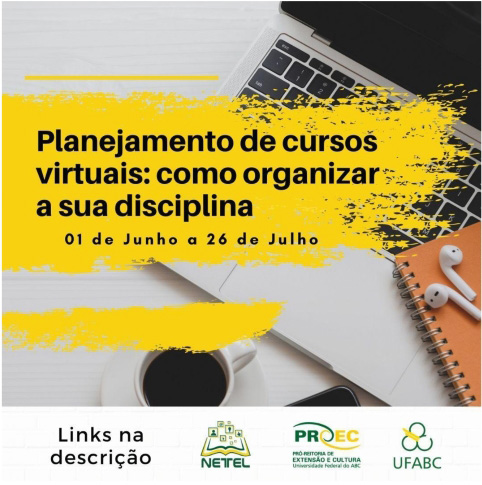
Workshops and events
Active Methodologies (Figure 2) was a workshop, consisting of 4 meetings, offered in 2018 and 2019 in the face-to-face modality, at UFABC’s Santo André campus. There were more than 200 registrations but, due to the capacity of the rooms, there were 24 participants in 2018 and 29 in 2019. Participants included teachers and students from the UFABC academic community and teachers from higher education institutions in the São Paulo metropolitan region. The main aim of the workshop was to develop practical skills for using active methodologies in the context of higher education. The workshop took an approach centered on the participants who, while learning about different teaching-learning practices, were also able to experience them throughout the course. Some of the records and activities are in the portfolio of the course offerings (Active Methodologies 2018 and Active Methodologies 2019). The researchers’ involvement included ideation, planning, preparation, execution and evaluation of the action.
Educa UFABC (Figure 3) was an event held in 2019, in person, on the Santo André campus of UFABC, which brought together 122 participants. It had an extension character during which the UFABC community and the region were invited to reflect on the theme Teaching in the 21st century. Conceived as part of the Classroom Lab (Classroom) project and supported by NETEL, it included practical and reflective workshops that allowed people to experiment with new educational tools, resources and pedagogical approaches. There were 8 hours of practical activities, given by teachers, researchers and education professionals from UFABC and 3 institutions (IFES, IFSP, CLQ).
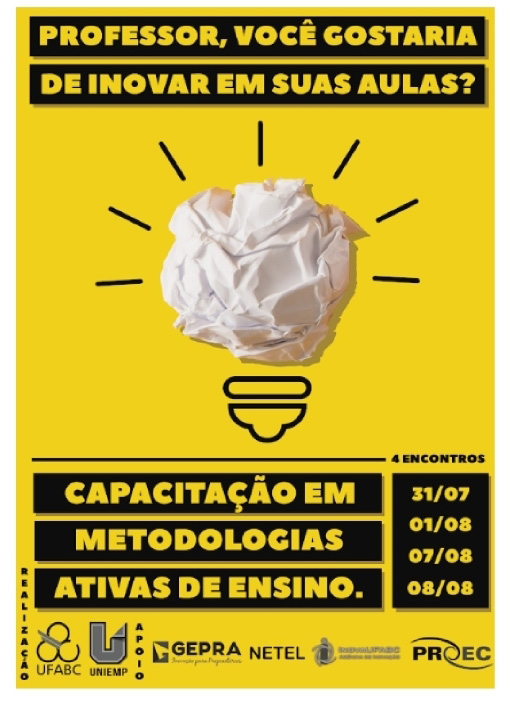
Source: https://express.adobe.com/ page/2a3MYoI1fTRVI/
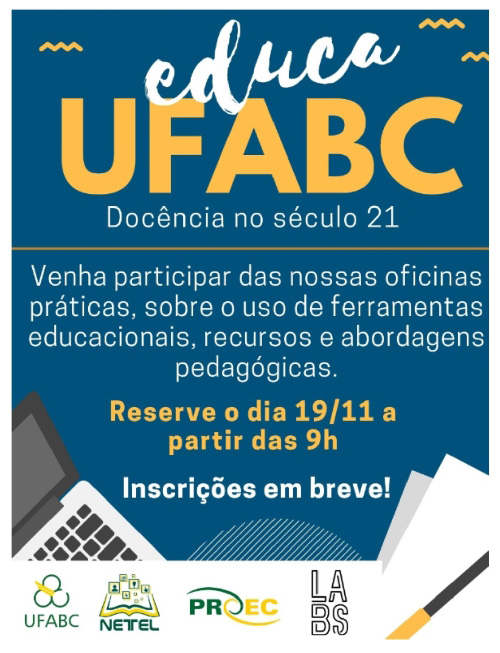
Source: https://educaufabc.wixsite.com/educaufabc
The program was varied, according to the event’s website. The involvement of researchers Carla Rodriguez and Carolina Carvalho included the ideation, planning, execution and evaluation of Educa, generating notes on the need for future actions to meet the challenges of 21st century education.
Reunited after offering the PCV 2020 and 2021, Carla Rodriguez, Carolina Carvalho and Marcella Abreu participated in the III edition of the UFABC Congress, which took place in September 2021, bringing the debate on the past, present and future of the University in celebration of its 15 years. At this event, the researchers proposed an online round table with the theme Experiences of teacher training during the pandemic: sharing practices in remote teaching (Figure 4). The aim was to present the course of the PCV (2020 and 2021) in the remote context, from the perspective of the teachers taking the course. Five teachers from different institutions (USP, São Paulo City Hall, UENP, UFABC) presented their experiences of planning their subjects online after taking part in the editions of the course, making visible the results of their training. This action was broadcast online, had 276 hits by June 2023 and is still accessible on UFABC’s YouTube channel.
The culmination of the (per)courses: EMBRACE international project
The actions offered in the form of courses, workshops and events culminated in the proposal for an international project called EMBRACE – “Education Modernization Brazil, Colombia, Europe – the new era of digital higher education cooperation” (Figure 5). EMBRACE is a project approved in the context of the ERASMUS-EDU-2022-CBHE call, which aims to support international cooperation projects based on multilateral partnerships between organizations working in the field of higher education, by means of actions that make it possible to improve the quality, modernization and responsiveness of higher education in countries not associated with the Erasmus+ programme.
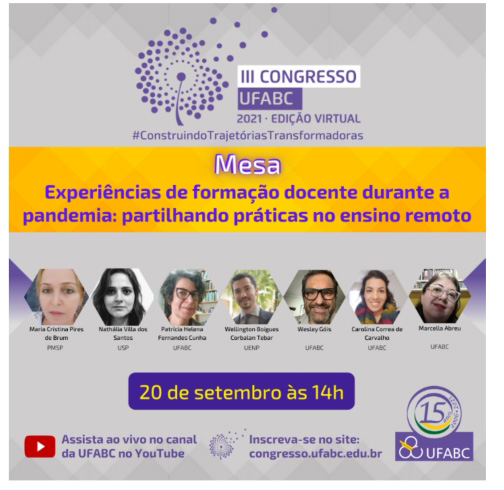
EMBRACE responds to the needs of Latin American partners to develop and implement institutional reforms, offering a strong contribution to the transformation of HEIs. In this context, education is seen as a means of responding to regional and global challenges. The project is led by HAMK (Finland), a university with extensive experience and expertise in teaching and learning and teacher training projects. IPB (Portugal) supports the ongoing work, bringing its expertise in developing projects and partnerships with companies and industries, enabling meaningful teaching geared to the needs of society, both in the public and private sectors.
The Brazilian partner universities UFABC, IFES and IFSP and the Colombian universities UTP and Areandina seek to develop teaching-learning interactions, as well as building an ecosystem of partnership between industry, university and society, through education based on new technologies and closing the gap between academia and the world of work.
Started in April 2023, this project will run for 3 years, with its closing workshop at the IFSP and UFABC institutions in March 2026. As a result of the EMBRACE project, it is hoped to consolidate modern and resilient HEIs in Latin America, with the capacity to use digitalization to create inclusive and student-centred learning experiences [1] (Figure 5).
The involvement of researchers Carla Rodriguez and Carolina Carvalho in EMBRACE goes beyond participation in the management of the UFABC team in the project: it involves involvement in the planning, execution and evaluation of the impacts of the actions developed throughout the process and includes engagement in their own training to develop their skills in areas, such as educational management, that support the transformation of HEIs and the creation of a sustainable learning ecosystem integrating universities, companies and industries.
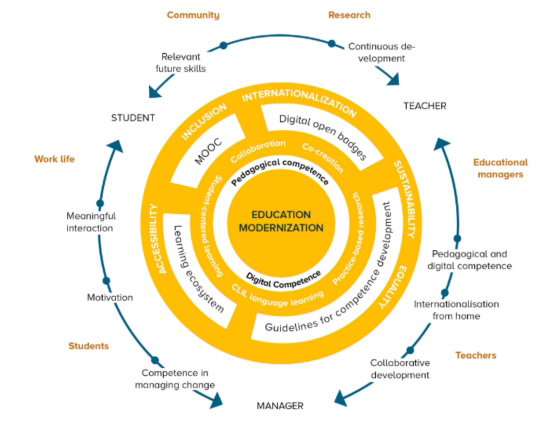
Source: EMBRACE Proposal (2022)
Future prospects and (per)courses
In this article, we seek to recapture and describe the experiences in teacher training that fostered actions before and after the PCV, in the form of courses, workshops and events that resulted in an international project that supports the transformation of HEIs. The EMBRACE project opens up opportunities for building a learning ecosystem that enables UFABC to further develop one of its important pillars, teaching.
In line with the pedagogical project, EMBRACE promotes teacher training in higher education, which must be attentive to the need for meaningful educational experiences centered on the academic and professional training of students, through innovative pedagogical models, with the integration of technologies that are also essential in the 21st century world of work.
We believe that, in order to promote the transformation of the teaching-learning process at an HEI, it is important to raise awareness among the academic community, to have institutional support and the engagement of all levels, with the support of managers, for dissemination, drawing up guidelines and constant support. This can encourage teachers to engage in training activities so that the results have an impact on their own practices and the evidence is perceived by everyone involved (beyond the classroom).
Note
[1] Available at: https://portal3.ipb.pt/index. php/en/gri/other-programs-and-projects
Accessed on: 25 Jun 2023.
Authors
Carolina Correa de Carvalho
Adjunct Professor at UFABC (CECS). Her research interests are continuous development of teaching and learning, teacher training, institutional transformation for the modernization of higher education.
carolina.carvalho@ufabc.edu.br.
Carla Lopes Rodriguez
Adjunct Professor at UFABC (CMCC) and researcher at LIRTE. Her research interests are related to Informatics in Education and Human-Computer Interaction.
c.rodriguez@ufabc.edu.br
Marcella dos Santos Abreu
Adjunct Professor at the Federal University of Piauí (Center for Human Sciences and Letters). She supervises research in the area of Applied Linguistics and teacher training from the perspective of literacy and critical linguistic education.
marcella.abreu@ufpi.edu.br
